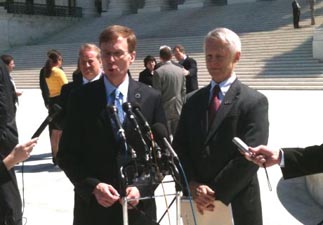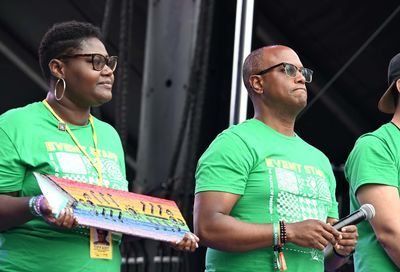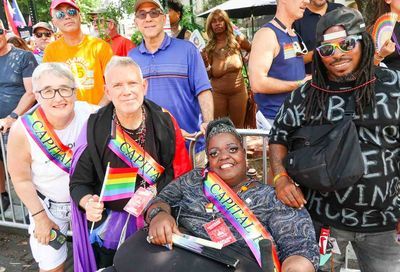Hostile Court
In case challenging disclosure of names of those who signed anti-gay petition in Washington, Scalia notes that ''democracy takes a certain amount of civic courage''
Lawyers attempting to keep secret the names of those who signed the petition to put Washington’s domestic partnership referendum on the ballot fought an uphill battle at the U.S. Supreme Court on Wednesday, April 28.

Washington Attorney General Rob McKenna (R), left, and Secretary of State Sam Reed (R) talk to reporters after the oral arguments were held at the U.S. Supreme Court in Doe #1 v. Reed.
(Photo by Chris Geidner)
Coming up against aggressive questioning from several justices, particularly Justices Antonin Scalia and Ruth Bader Ginsburg, attorney James Bopp – challenging Washington’s disclosure requirements as violating the First Amendment – was almost lectured by Scalia, ”Running a democracy takes a certain amount of civic courage.”
The question before the court was two-fold, with justices first deciding whether the action of signing the Referendum 71 petition was a ”legislative act” or purely ”political speech” and then, depending on that decision, determining whether the state’s disclosure requirements are permissible.
Scalia began the questioning at the court, asking how Washington’s petition signers’ disclosure requirements were different from the campaign finance disclosure rules upheld in the court’s 1976 case of Buckley v. Valeo. Bopp began by answering that the state interests were less significant here than in that case – calling the value of this disclosure ”marginal” at several points – and that the possibility of harassment was at issue in this case.
Before he could get further, Justice Sonia Sotomayor quickly asked about the application of Bopp’s theory to all voter registration disclosure laws and candidates’ petitions for office. Bopp repeated his claim that different – and presumably greater – interests in disclosure would be involved in those situations.
Representing the Washington Secretary of State Sam Reed (R) before the court was the state’s attorney general, Rob McKenna (R), who faced far less aggressive – but at times more nuanced – questioning from the court about the scope of the broad democratic interest in disclosure claimed by the state.
When Justice Samuel Alito asked how a more narrow ”as-applied” – or case-specific – challenge could succeed in showing a need to prevent disclosure, he added, ”look at what happened with Proposition 8” in California – referring to incidents of boycotts and alleged harassment in the state.
McKenna responded that, under state law, ”I think the evidence . . . would have to rise to the threat of violence,” a point addressed at length in the brief supporting Washington that was filed by several national LGBT legal and political groups.
Although Justice Clarence Thomas asked nothing, as is usual for him, an opinion he wrote earlier this year suggests the he places great weight on Bopp’s argument about the concerns of harassment.
Scalia was – unsurprisingly – the most pointed in his questions but, more surprisingly to some, found himself on the same side of the argument as those LGBT groups and opposing the briefs filed by the Alliance Defense Fund and the National Organization for Marriage.
Speaking of criticism that people who signed the petition might face, Scalia mused, ”Is that such a bad thing in a democracy?” Becoming characteristically frustrated, Scalia complained that Bopp’s was ”such a touchy-feely” position and concluded, ”You can’t run a democracy this way.”
After the argument, two of the authors of the LGBT organizations’ brief – Susan Sommer, Lambda Legal Defense and Education Fund’s director of constitutional litigation, and Shannon Minter, the legal director at the National Center for Lesbian Rights – talked about Scalia’s support for Washington’s disclosure law at the argument.
Sommer said, ”I sure am glad he was.”
”That was very enjoyable,” Minter said.
”He made some really good points,” Sommer added.
”I agree with him,” Minter said. ”You can’t run a democracy this way. You can’t run a democracy without open government laws and transparency in the lawmaking process, and I think that’s the heart of the case.”
In explaining the view that the disclosure requirement is a reasonable decision subject to the ordinary legislative process, Scalia told Bopp during the argument that ”the people of Washington think this is not too much of an imposition.” Bopp responded that they ”didn’t do that for a century” — to which Scalia retorted, ”Proving my point.”
Bopp took pointed questions from across the bench, with the most sympathetic voice coming from Alito, who asked about the extent to which the disclosure argument could go. Asking about whether a federal agency could require certain demo graphic information in submission of rule-making comments, Bopp responded that there would be no sufficient government interest in such a requirement.
When Alito later asked McKenna ”how far” Washington was seeking the court to allow disclosure to go, McKenna responded that the state wouldn’t have an interest in, for example, disclosure of phone numbers of petition signers.
McKenna also noted – picking up on a point made several times by Scalia about non-secret elections in the early part of the country’s history – that places in New England still have town hall meetings where decisions are made publicly and that several states have caucuses, in which people select candidates publicly.
Today was the last day of arguments for the court’s current term and, as such, the last argument in which Justice John Paul Stevens, who has announced his retirement, will be participating. He asked only one question, musing to Bopp about an additional possible interest in the disclosure of the names of those who sign petitions: Couldn’t a person say of the signers, ”I’d like to try and persuade them to modify their view”?
Bopp replied, ”It’s possible,” adding for an additional time that it’s a ”very marginal” interest.
The court has no set timeline for when it must issue a decision on the case, Doe #1 v. Reed, but decisions for the term usually are all issued prior to the Fourth of July holiday.
Support Metro Weekly’s Journalism
These are challenging times for news organizations. And yet it’s crucial we stay active and provide vital resources and information to both our local readers and the world. So won’t you please take a moment and consider supporting Metro Weekly with a membership? For as little as $5 a month, you can help ensure Metro Weekly magazine and MetroWeekly.com remain free, viable resources as we provide the best, most diverse, culturally-resonant LGBTQ coverage in both the D.C. region and around the world. Memberships come with exclusive perks and discounts, your own personal digital delivery of each week’s magazine (and an archive), access to our Member's Lounge when it launches this fall, and exclusive members-only items like Metro Weekly Membership Mugs and Tote Bags! Check out all our membership levels here and please join us today!

























